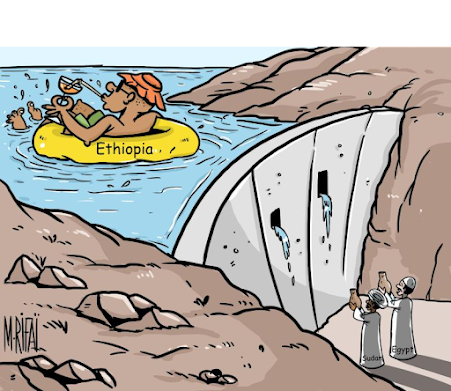MAN MADE? MAN SAVED?
Previously, I touched on the consequences of the construction of GERD, especially surrounding water shortages and thus food production shortages for the lower riparians. Today I will be exploring what has been done to synergistically mitigate these consequences and answer the question..
‘So what is good about GERD?’
‘So what is good about GERD?’
With such a mega-project involving three states it is unrealistic to presume there would be no risks associated, suggesting the heightened tensions between the Ethiopia and predominantly Egypt is down to misunderstandings surrounding the nature of the risk GERD will pose to Egypt. The scenario can be seen as an asymmetric Tragedy of the Commons (Bonne, 2021), in which Ethiopia exerts control and acts in act in self-interest over a shared finite resource that all sides have an interest in; However in Hardin’s 1968 example of the concept using pasture, the situation can be resolved using either privatization or regulation in terms of permits. However, the non-excludable nature of the Nile River creates a unique situation giving rise to social contracts in the form of Collective Decision making.
This idea is demonstrated through The International Panel of Experts, a tripartite panel. In the final report they suggested no dam[ning] effects on any of the three countries (AHAHA!), but rather benefits for Egypt and Sudan.
Water Management
During the dry season GERD will provide regulated and sustainable minimum flow levels maintaining stable all-season supply to downstream irrigation systems, decreasing harvest losses due to water shortages during important growing periods, overall allowing for greater agricultural productivity downstream (Tesfa, 2013). This alongside drought control at the AHD will reduce the likelihood of arable land desertifying, while a robust plan will regulate agriculture, reducing waterflow uncertainty and maintain a healthy water-level at the AHD for Egypt to continue to use (Mohamed 2017). However, this is made upon the assumption that Ethiopia will use the Dam only for Electricity and increased basin wide cooperation (ibid.) In fact, if Egypt & Sudan shared both legal and financial ownership rights of GERD, they could ensure that water is released from the dam right before the peak agricultural season, reducing Egypt’s annual water loss by 6%. And enabling Ethiopia to irrigate around 500,000 ha of land (Nigatu and Dinar, 2015).
Water Conservation
Egypt receives an average of 12mm of rainfall annually, and thus is highly dependant upon irrigation for agricultural food production (Abdel-Shafy et al. 2010). Only 4% of the land being arable and agricultural land, resulting in overwatering by which gallons of water are thrown onto crops, wasting water. Based on yearly averages of daily evaporation, Laker Nasser evaporates over 6.3mm day−1 of water, summing to 12 million m3 annually (Omar & Negm, 2018), increasing water usage and thus pressure for sustained food production. Research by Mulat and Moges (2014) indicated that the planned 6-year filling duration will have minimal little impact on the current irrigation water demands, while reducing evaporation by 22%. Following GERD AHD will continue to function at a 96% reliability level, positively affecting food production as there is less water wasted in the dry region. And as for Sudan, it is estimated 14.3 billion cubic meters of water evaporates from the AHD and other dams in Sudan annually. Conversely, evaporation loss from GERD is no more than 0.4 BCM, reducing the operating level of wasteful dams.
Climate Adaptation
- Controlling floods
- Decreasing evaporation
- Allowing greater freedoms in money available for investment into climate adaptations (ibid.)
Due to Egypt’s food-insecure nature alongside the impending threats of climate change, the freedom to diversify and adapt food production diminishes the vulnerability of the agricultural sector, increasing food security. With GERD making the Nile more resilient, riparian’s can divert their focus to combat worsening climate variability through:
- Seawater desalinisation
- Maximising efficiencies in water use
- Irrigation and Improve rain harvesting techniques
To Conclude….
GERD emblematizes the promise of alleviating food, water, and energy constraints in a developing region by exchanging water and energy between basin states based on marginal production. However, for this food–water–energy nexus to thrive, tripartite basin-level collaboration and food security diversification are required.
‘Necessity is the mother of invention’ so…
Will Sudan and Egypt to adapt?



Great post! The video was also highly interesting. You give a great oversight of the positives of GERD and some of your own conclusive insights, supported by appropriate literature. I look forward to the next!
ReplyDeleteYou didn't seem to touch on what are the benefit for the actual purpose of the dam as an electric provider? Economic and generally?
GERD will allow underperforming downstream hydropower schemes to perform more effectively as there will be more reliable sediment free, and regular availability of water throughout the year, as said by Tesfa (2013)
DeleteGERD alone will enable Ethiopia to produce 15 bkWh of electricity; creating a multiplier effect of producing cheap electricity, spurring economic development through selling electricity to its neighbouring countries, and importing food commodities, which otherwise results in inefficient use of the region’s resource!
Another great entry with a variety of media- from maps, memes and videos. It keeps me wanting to read more!
ReplyDeleteA lot of this blog focused on the effects to Ethiopia and Egypt's food security and hydrology, how would Sudan play a role in this?
Due to the intertwined relationship between all three nations water flow, understanding the changes to hydrology in upstream Ethiopia due to GERD will help facilitate Egypt and Sudan to mitigate risk through the development of water budgets under various management scenarios, as seen by Ayana & Srinivasan 2019; with particular importance for Sudan, the largest area under cereal production in the Nile basin
Delete